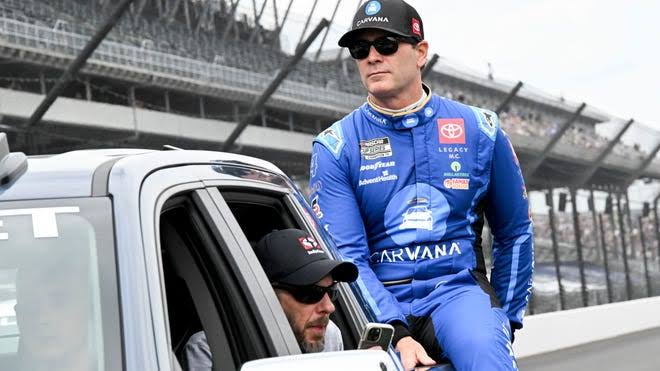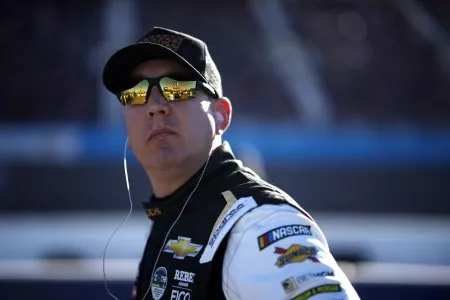Do NASCAR Drivers Get a Performance Bonus? JGR Official Weighs In
NASCAR, one of the most popular motorsports in North America, is known for its high-octane races, intense competition, and the large fan base that surrounds it. At the heart of NASCAR’s ecosystem are the drivers—athletes who risk their lives each time they step behind the wheel to compete at some of the most prestigious racing venues in the world. But aside from the fame, glory, and sponsorship deals that come with being a NASCAR driver, an important question often arises: Do NASCAR drivers get a performance bonus?
This article delves into the various forms of compensation NASCAR drivers receive, with particular focus on the performance incentives that are embedded in their contracts. To provide insight into this topic, we take a closer look at the perspective of a Joe Gibbs Racing (JGR) official, one of NASCAR’s most successful and well-known teams. JGR has not only been home to some of the sport’s most talented drivers but has also been at the center of a revolution in how race teams approach driver compensation.
The Basics of NASCAR Driver Compensation
Before diving into the specifics of performance bonuses, it’s important to understand the general structure of how NASCAR drivers are compensated. NASCAR drivers receive their pay in various forms:
1. Base Salary: Many drivers, especially those on major teams like Joe Gibbs Racing, are given a guaranteed base salary. This amount is often negotiated based on a variety of factors such as experience, past performance, and marketability. The base salary ensures that drivers receive a steady income regardless of race outcomes.
2. Race Payouts: Drivers also earn money based on their performance during individual races. This money can come from prize winnings or race purses, which are distributed based on finishing positions. For example, the winner of the Daytona 500 could receive a significant payout, while finishing in the 30th position would earn a much smaller sum. These payouts are typically shared among the driver, the team, and sometimes their sponsors.
3. Sponsorship Deals: NASCAR drivers are often the face of corporate sponsorships, and these deals are a major revenue stream for the driver and the team. A portion of the sponsorship money is directed to the driver, especially if the driver is an established star who brings visibility to the brand. The more visible the driver is, the more lucrative these deals tend to be.
4. Endorsements: In addition to team and race-specific sponsorships, drivers also frequently secure individual endorsement deals. These deals can include partnerships with various brands in automotive, apparel, technology, and more. High-profile drivers like Kyle Busch or Denny Hamlin have endorsement deals that extend beyond NASCAR itself.
Performance Bonuses in NASCAR: A Closer Look
So, where do performance bonuses fit into this compensation structure? A performance bonus is generally an extra incentive that a driver receives for achieving certain goals or reaching specific milestones during a season. These bonuses are designed to motivate drivers to perform at their best and provide them with a financial reward when they do. Performance bonuses in NASCAR can be tied to various factors, including:
Race Wins: A common performance bonus is for race victories. Winning a race is one of the most significant achievements in NASCAR, and as such, drivers may receive a hefty bonus for each race they win. This is especially true for top-tier teams like Joe Gibbs Racing, where winning races is expected.
Points Finishes: The NASCAR season is a points-based system, with drivers earning points based on their finishing positions in each race. A performance bonus may be tied to how a driver finishes in the standings at the end of the season, with bonuses awarded for high finishes in the final rankings, such as making the playoffs or finishing in the top 10 in points.
Playoff Advancements: The NASCAR Cup Series now has a playoff system that is similar to other professional sports leagues. Drivers who make it to certain stages of the playoffs, such as the Round of 8 or the final Championship 4, can receive performance bonuses for advancing to these key stages.
Milestones: Achieving career milestones, such as 100 career wins or a certain number of top-10 finishes, may also trigger bonuses for the driver.
Team and Manufacturer Bonuses: Drivers who represent teams with significant manufacturer support (e.g., Toyota, Chevrolet, or Ford) may also be eligible for performance-based bonuses from their manufacturer. This is particularly relevant for drivers at teams like JGR, where Toyota plays a critical role in team operations.
The Role of Joe Gibbs Racing (JGR) in Performance-Based Compensation
Joe Gibbs Racing (JGR) is one of the most successful teams in NASCAR history, with a long track record of championship titles, race wins, and a stable of talented drivers. JGR has been home to drivers such as Tony Stewart, Kyle Busch, Denny Hamlin, and current stars like Christopher Bell and Ty Gibbs. The team’s ability to attract top-tier talent is partly due to its commitment to driver development and the incentives it offers to drivers.
A JGR official weighed in on the topic of performance bonuses, explaining how they are structured within the team. The official, who asked to remain anonymous, discussed how JGR combines traditional salary structures with performance incentives to keep its drivers motivated and focused on success.
“We’ve always believed in motivating our drivers through performance,” said the JGR official. “At the end of the day, the goal for any NASCAR driver is to win races and contend for championships. That’s what drives the team, and that’s what drives our drivers. We want to reward them for their success, whether it’s a victory, a top-5 finish, or making it to the Championship 4. Performance bonuses are a key part of how we do that.”
Performance Bonus Structure at JGR
At Joe Gibbs Racing, performance bonuses are tied to several different categories:
1. Race Wins and Top Finishes: Like many other teams, JGR offers a substantial bonus for race victories. However, bonuses are also awarded for top-5 and top-10 finishes. These bonuses serve to incentivize consistency throughout the season, not just the occasional win.
2. Playoff and Championship Incentives: In addition to race wins, JGR drivers can earn bonuses for making it to the playoffs and advancing through each round. The further a driver progresses, the larger the bonus. For example, making it to the Championship 4 at the end of the season brings with it a significant performance bonus.
3. Manufacturer Bonuses: JGR, which runs Toyotas, is also eligible for manufacturer bonuses, especially when the team performs well in relation to other teams running the same brand. Toyota, as a key sponsor and manufacturer, provides additional performance incentives for drivers who help bring the brand success.
4. Personalized Contracts: While JGR maintains a standard bonus structure, each driver’s contract is customized to reflect their individual goals and aspirations. Veteran drivers like Denny Hamlin or Kyle Busch have negotiated performance bonuses that are reflective of their past success and expectations for future performance.
5. Team-Based Achievements: JGR also rewards team-wide accomplishments. For example, if the entire team finishes in the top-10 in the standings, there may be a collective bonus shared among the drivers and key staff. This is a team-oriented approach that emphasizes collaboration and mutual success.
Are Performance Bonuses the Key to Success?
Performance bonuses serve more than just a financial purpose. They are designed to encourage competition, boost morale, and foster a culture of achievement within the team. According to the JGR official, the presence of these bonuses is crucial to maintaining a high level of performance.
“Performance bonuses are part of the DNA of NASCAR racing,” said the official. “The drivers are highly competitive individuals. Having a performance-based structure ensures they remain focused on their goals. It keeps them hungry for success, and that’s important in a sport like ours, where margins between victory and defeat can be razor-thin.”
This system of performance-based incentives is not unique to Joe Gibbs Racing but is also prevalent across other top NASCAR teams. Teams like Hendrick Motorsports and Team Penske have similar bonus structures in place, ensuring their drivers are always striving for excellence.
The Controversy: Are Performance Bonuses Fair?
While performance bonuses are a standard practice in NASCAR, there are always discussions about fairness, particularly for drivers who may be struggling to achieve the same level of success as their teammates. A driver who finishes mid-pack consistently may not have the same opportunity to earn large bonuses as someone who is winning races and finishing in the top 10 every week.
Some argue that these bonus structures can create a disparity between drivers, especially when there is a significant difference in resources between top teams like JGR and smaller teams. For example, a driver at a small team may have limited access to the same level of equipment, support, and resources as a driver at JGR, making it harder for them to perform at the same level and thus earn the same bonuses.
However, JGR’s official perspective is that these incentives are designed to reward the highest achievers, and part of the reason for the team’s success is its ability to attract top-tier talent.
“At the end of the day, it’s about performance,” the official noted. “We provide our drivers with the best resources possible, and we believe that the best drivers will excel in that environment. Our bonus structure is designed to reward that excellence, and we’re proud to see our drivers perform at such a high level.”
NASCAR drivers certainly do get performance bonuses, and for teams like Joe Gibbs Racing, these bonuses play a significant role in motivating drivers and ensuring that they remain focused on achieving success. Performance bonuses are awarded for race wins, top finishes, playoff advancements, and other significant milestones, and they serve as a key incentive for drivers to continue pushing the boundaries of what






